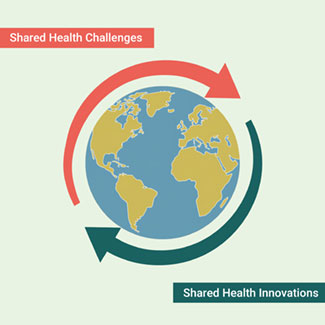 Fogarty International Center
Fogarty International Center
The Global Health Reciprocal Innovation (GHRI) project is coordinated by Fogarty's Center for Global Health Studies (CGHS) and has included participation by 13 NIH Institutes and Centers (listed below).
Project Goals
The goal of this project is to explore ways in which global health reciprocal innovation can enhance the impact and spread of health technologies, methodologies and strategies researched and developed in low- and middle-income countries (LMICs) to address similar health and health related challenges in different geographic locations and contexts, especially in high-income countries (HICs). The project has explored promising models of research funding, research methods, and frameworks that can enhance the mutual benefit, adaptation, scale up and dissemination of global health innovations in diverse settings.
What is Reciprocal Innovation?
For the purposes of this project, we have focused on finding case examples of bidirectional or multidirectional exchanges of global heath innovations and are using the following definition of “reciprocal innovation" from the Indiana University Center for Global Health “Reciprocal Innovation is the bi-directional and iterative exchange of a technology, methodology, or process between at least two countries, one lower- or middle-income country and one high income country, to address a common health challenge and provide mutual benefit to both sides. Lessons learned are continually shared throughout the process to suit the needs and infrastructure of each country."
Utilizing the approach of reciprocal innovation, the original intervention is enhanced, and its reach is extended to the mutual benefit of all parties involved in the research. Reciprocal innovation has three characteristics according to Sors et al (2022):
- global health partnership rooted in the values of reciprocity, mutual learning, and equity across partner institutions in HICs and LMICs,
- a bi-directional and co-constituted approach to identifying shared health challenges across settings in long-term engagements, and
- identification of high-quality innovations from global health partnerships for demonstration, replication, and dissemination in diverse settings."
Project Activities
 Photographed by Gaston HinostrozaCyclists during the first “Iconic Wilshire” Ciclovia. Los Angeles, CA
Photographed by Gaston HinostrozaCyclists during the first “Iconic Wilshire” Ciclovia. Los Angeles, CA
Through several activities, including a
workshop and an article series, we have explored examples of methods, frameworks and approaches to innovation transfer (usually unidirectional) and innovation exchange (usually bidirectional) between LMICs and HICs.
Satellite Session at AIDS2024 Conference
Experts on global health reciprocal innovation and authors in the article series participated in a session at the AIDS2024 Conference in July 2024. The session introduced the concept of GHRI, and explored barriers, facilitators, and lessons learned for implementing a GHRI approach.
Article Series
A new supplement in
BMJ Global Health highlights successes and challenges in the exchange of innovations between low- and middle-income and high-income countries.
Past Activities
-
October 24-26, 2022: NIH convened scientific experts, funders, and policy makers to highlight case examples and explore models, frameworks, opportunities, and barriers for using reciprocal innovation in global health research. We discussed how to advance reciprocal innovation in future global health research. This workshop informed the resulting supplement in
BMJ Global Health.
Workshop agenda and recordings.
-
2021-2022: In partnership with the NIH library and two fellows, Dr. Jepchirchir Kiplagat (AMPATH/Fogarty Fellow) and Dr. M.C. Sage Ishimwe, (NIH NIMHD-NIDDK Rwandan Health program fellow), CGHS conducted a scoping review of the literature describing reciprocal innovation in global health research. This
scoping review is published in the
BMJ Global Health supplement.
-
October 2020: Harnessing projects collected from the 2019 Request for Information, CGHS partnered with the National Institute of Mental Health (NIMH) and the NIH Office of Behavioral and Social Sciences Research (OBSSR) to host a webinar: Transferring HIV and Stigma Reduction Interventions from LMICs to the U.S. Researchers shared case examples of HIV interventions that were transferred from LMICs to the U.S., with a focus on stigma reduction interventions. Presenters described frameworks for intervention transfers and key barriers and facilitators to this type of research.
-
2019: The Global Health Reciprocal Innovation project began with an environmental scan, which included a Request for Information (RFI) from the scientific community.
Partners
NIH Partners
The following NIH Institutes, Centers and Offices have partnered with Fogarty on the Global Health Reciprocal Innovation project:
HHS Partners
Resources
-
Indiana CTSI (Clinical and Translational Sciences Institute): Global Health Innovation Exchange
- Thomas G. Sors, Rishika Chauhan O'Brien, Michael L. Scanlon, Li YuanBermel, Ibrahim Chikowe, Adrian Gardner, Jepchirchir Kiplagat, Marya Lieberman, Sharon M.Moe, Nydia Morales-Soto, Winstone M. Nyandiko, David Plater, Betsy Cheriro Rono, WilliamM. Tierney, Rachel C. Vreeman, Sarah E. Wiehe, Kara Wools-Kaloustian & Debra K. Litzelman (2022): Reciprocal innovation: A new approach to equitable and mutually beneficial global health partnerships, Global Public Health
Inquiries
Nalini Anand, J.D., MPH.
Director, Center for Global Health Studies
Fogarty International Center
U.S. National Institutes of Health (NIH)
Email: Nalini.Anand@nih.gov
Phone: 301-402-7348
Updated October 1, 2024